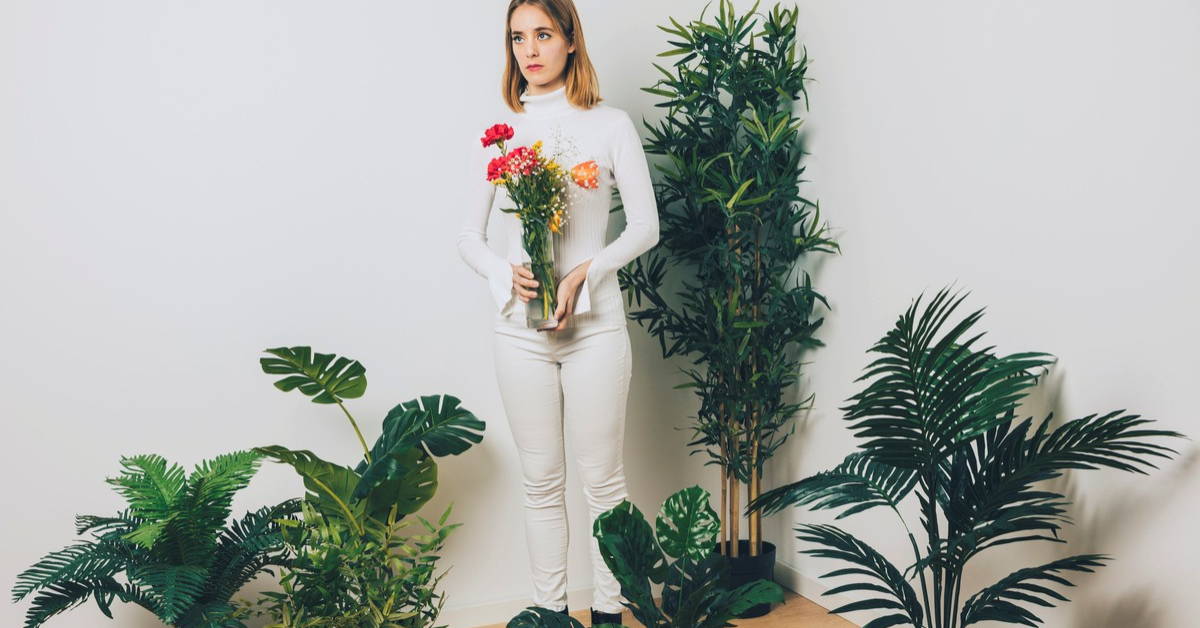
Fake vs Real Plants? What is the Best Choice for Your Home?

*Collaborative Post
When it comes to home decor, you’d be hard pressed to find something that brightens up a room like plants do. Some homeowners opt for a cozy bohemian vibe, others prefer a sleek minimalist design, and some go for a classic rustic aesthetic.
But it doesn’t matter what satisfies your décor curiosity, greenery adds texture, color, and a sense of life. However, one big question often comes up for homeowners and renters alike. Should you decorate with real plants or fake ones?
There’s no denying that real plants offer undeniable beauty and health benefits. But fake plants have come a long way, and can be surprisingly convincing. The decision isn’t always straightforward. Let’s explore the pros and cons of both options to help you determine what’s best for your home.
The Case for Real Plants
Should you choose to go with real plants, you’ll be in for quite a number of pleasant surprises.
1. Natural Beauty
There’s something deeply satisfying about the vibrant, living presence of a real plant. Each leaf has its own unique character. And seriously, nothing beats watching your plant grow over time. It brings a sense of accomplishment and connection to nature. Realistic as artificial plants may get, they just can’t replicate the subtle movements and organic imperfections of a living one.
2. Air Purification
One of the biggest advantages of real plants is their ability to purify the air. NASA’s Clean Air Study found that certain indoor plants can remove toxins from indoor environments. We’re talking about serious contaminants like formaldehyde and benzene. Such plants as spider plants, peace lilies, and snake plants are a perfect example for this.
Well honestly, you would need a large number of plants to significantly improve air quality. But, even a few can make a noticeable difference.
3. Mental Health Benefits
Numerous studies have shown that caring for real plants can reduce stress, improve mood, and even boost productivity. The act of watering, pruning, and nurturing a living thing offers therapeutic benefits. This can be especially helpful for those who spend long hours indoors or working from home.
4. Seasonal Changes and Growth
Real plants change with the seasons. This can add an interesting dynamic to your home decor. New leaves in spring, flowering in summer, or dormancy in winter. These shifts may seem subtle, but they create a rhythm that artificial plants simply can’t match.
Drawbacks of Real Plants:
With all those benefits, can real plants have any drawbacks? Well we hate to be bearers of bad news, but yes, it turns out there are a few you should keep in mind;
- Maintenance: Real plants require water, light, pruning, and occasional repotting. If you travel frequently or have a busy schedule, keeping them alive can be a bit of a challenge.
- Pest Issues: Soil can attract gnats or other insects, especially in humid environments.
- Sensitivity: Some plants are finicky about light, humidity, and temperature. Without the right conditions, they can quickly decline.
The Case for Fake Plants
So, what if you were to get fake plants, what should you expect?
1. Zero Maintenance
Well, almost zero maintenance because you’ll still need to dust it occasionally. The biggest advantage of artificial plants is that they require almost no care. No watering, no sunlight, no pruning. And the best of all, no worrying about your plant dying while you’re away on vacation. If you have a tight schedule, are allergic, or have no green thumb, fake plants offer a worry-free alternative.
2. Longevity and Durability
A well-made artificial plant can last for years, even decades, without fading or wilting. They’re not affected by seasonal changes, pests, or fluctuating temperatures. This makes them a practical choice for challenging environments. You can have it in bathrooms with no natural light, or on the side of a cold entryway.
3. Design Flexibility
Fake plants can be shaped and styled however you like. You can find topiaries, hanging vines, and exotic species. Some of these would otherwise be difficult to maintain in real form. Designer Plants Australia often create dramatic arrangements that would be impractical with live greenery.
4. Safe for Pets and Kids
Many common houseplants – like philodendrons, pothos, and peace lilies, are toxic to pets. Artificial plants eliminate that concern entirely. Therefore, you get a safer alternative for households with curious cats, dogs, or small children. Plus, with fake plants, if they bend a part of the plant, you can reshape it. The same can’t be said for a broken twig on a real plant.
Drawbacks of Fake Plants
And just like the real plants, fake ones come with their fair share of downsides, too;
- No Air Quality Benefits: Fake plants don’t contribute to cleaner air or higher humidity.
- No Emotional Connection: They don’t grow, change, or interact with their environment. So, you miss out on the therapeutic aspects of nurturing something living.
- Quality Varies Greatly: While some artificial plants look incredibly lifelike, some look obviously fake. Cheap materials, poor coloring, or unnatural shapes can bring down the look of your space.
- Environmental Concerns: Most fake plants are made of plastic or silk and are not biodegradable. If sustainability is a priority for you, this might be a deal breaker.
At the end of the day, three aspects play a crucial role. Lifestyle, lighting, and budget. Aesthetic goals also count but not by much.
If you’re constantly traveling, or a bit forgetful, go for fake plants. The same goes if your home has minimal natural light, unless you go for low-light species like snake plants or ZZ plants.
Budget-wise, real plants may have low upfront cost, but costly to maintain (and replace if they wither). High quality fake ones are a bit costly, but it’s pretty much a one-time investment.
*This is a collaborative post. For further information please refer to my disclosure page.




